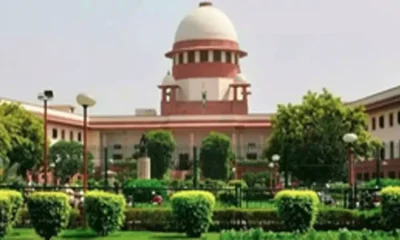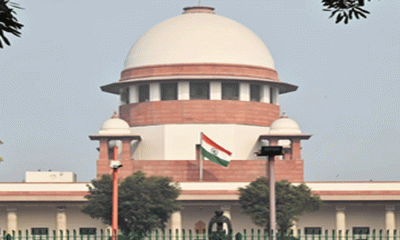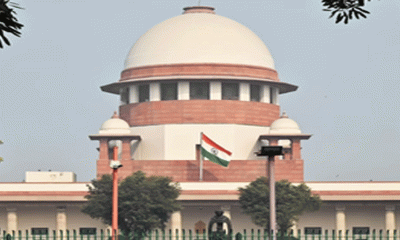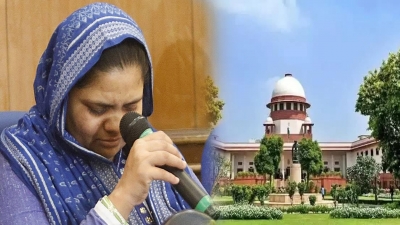Politics
Interim order for ‘Shivling’ protection to continue, suit transferred to district judge: Supreme Court
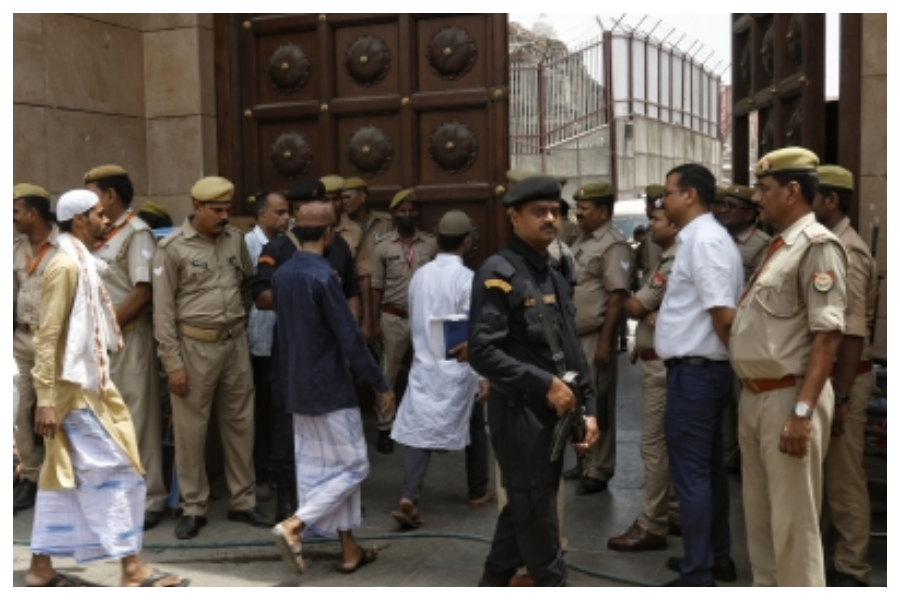
The Supreme Court on Friday said its interim order of May 17, directing protection of the ‘Shivling’, which was purportedly discovered during the survey in Varanasi’s Gyanvapi mosque, without impeding the right of Muslims to offer namaz there, would continue, pending disposal of application challenging maintainability of the suit by Hindu parties, and thereafter for a period of 8 weeks.
A bench, headed by Justice D.Y. Chandrachud and comprising Justices Surya Kant and P.S. Narasimha, said taking in view of complexity of the issues involved in the suit and the sensitivity, the suit before Civil Judge, Senior Division, Varanasi should be tried before a senior and experienced judicial officer of the Uttar Pradesh Higher Judicial Service.
The top court directed the transfer of the case pending before Civil Judge, Senior Division to the District Judge Varanasi for trial.
The top court also asked Varanasi’s District Magistrate to consult with parties to ensure that appropriate arrangements are made for ‘wuzu’ (pre-prayer abolutions).
Senior advocate Huzefa Ahmadi, representing the Committee of Management Anjuman Intezamia Masajid Varanasi, contended that the status quo of 500 years had already changed by sealing the premises and added that the status quo, which existed before, must continue.
Crime
Police bust interstate mobile theft gang; 40 high-end phones stolen in Delhi concert recovered

New Delhi, Dec 11: The Delhi Police Crime Branch has arrested four members of an interstate mobile phone theft gang and recovered 40 high-end smartphones, many of which had been stolen from a December 7 concert at IGI Stadium, officials said on Thursday.
A team from the Eastern Range-I of the Crime Branch, led by Inspector Ashish Sharma and supervised by ACP Sunil Srivastav, tracked the suspects for nearly 48 hours before intercepting them near Yamuna Vihar Metro Station on December 9.
The police said the accused kept shifting locations to evade surveillance, forcing the team to maintain continuous technical tracking.
The arrested men have been identified as Salman (35), Imran (28), Shahrukh (32) and Wasim (25), all residents of Ghaziabad.
Police recovered eight Apple iPhones — including iPhone 17 Pro Max and the iPhone 16 series along with seven premium Samsung models such as the Galaxy S24 Ultra and Fold 6.
The remaining phones belonged to OnePlus, Vivo, Oppo, Redmi, POCO and Motorola.
Several of the recovered devices have already been matched with FIRs registered at Prashant Vihar, Shahbad Dairy and IP Estate police stations.
According to officers, the gang targeted crowded public places such as concerts, metro stations, bus stops, bars, marketplaces and railway stations.
During interrogation, the alleged kingpin, Salman, confessed that they focused on events frequented by young people carrying expensive phones. Police said the group had been operating across Delhi-NCR for several months.
“The stolen phones were then swiftly shifted to Ghaziabad (Uttar Pradesh), where the gang had established contacts in the grey market. The high-end devices were sold at throwaway prices within hours of the theft, making recovery extremely difficult,” the police said in its press note.
“Salman admitted that the gang had been actively operating in Delhi-NCR for the past several months and had committed scores of such thefts, earning them lakhs of rupees with almost no risk of getting caught until the present arrest,” it added.
Police said the four have been booked under Sections 35(1)(E) and 106 of the Bharatiya Nagarik Suraksha Sanhita (BNSS).
“This operation underscores the Delhi Police Crime Branch’s commitment to curbing organised crime and apprehending hardened criminals. Efforts are ongoing to apprehend the accused’s associates and others, and to verify additional cases linked to the accused,” said DCP Vikram Singh.
Maharashtra
Mumbai: Accused wanted in Kurla Methi River irregularities arrested, accused of cheating crores of rupees and creating fake AMU

Mumbai: Economic Wing AOW has claimed to have arrested the wanted accused and contractor in the case of Mithi Nadi cleanliness and irregularities. The AOW has arrested the absconding wanted Sunil Shyam Narayan SM Infrastructure, Mahesh Madhav Rao Purohit. During the investigation of the Mithi Nadi contract and irregularities worth crores of rupees, the police had registered a case. Earlier, three accused were arrested. According to the EOW, from 2013 to 2023, fake MAUs were prepared and bills worth crores of rupees were approved in collusion with BMC officers. A proposal to purchase a machine to remove garbage from 2021 to 2024 was also approved and under the guise of the same, a fraud of crores of rupees was committed for cleaning the garbage. In this case, the police have arrested the accused agents Ketan Kadam, Jay Joshi and Mithi Nadi contractor Sher Singh Rathore. By preparing fake documents, the accused also prepared fake AMUs and also signed fake signatures. The accused were produced in court and remanded in custody until December 16.
Maharashtra
ED, ATS Conduct Raids Across Maharashtra & Delhi Over Suspected Terror-Funding
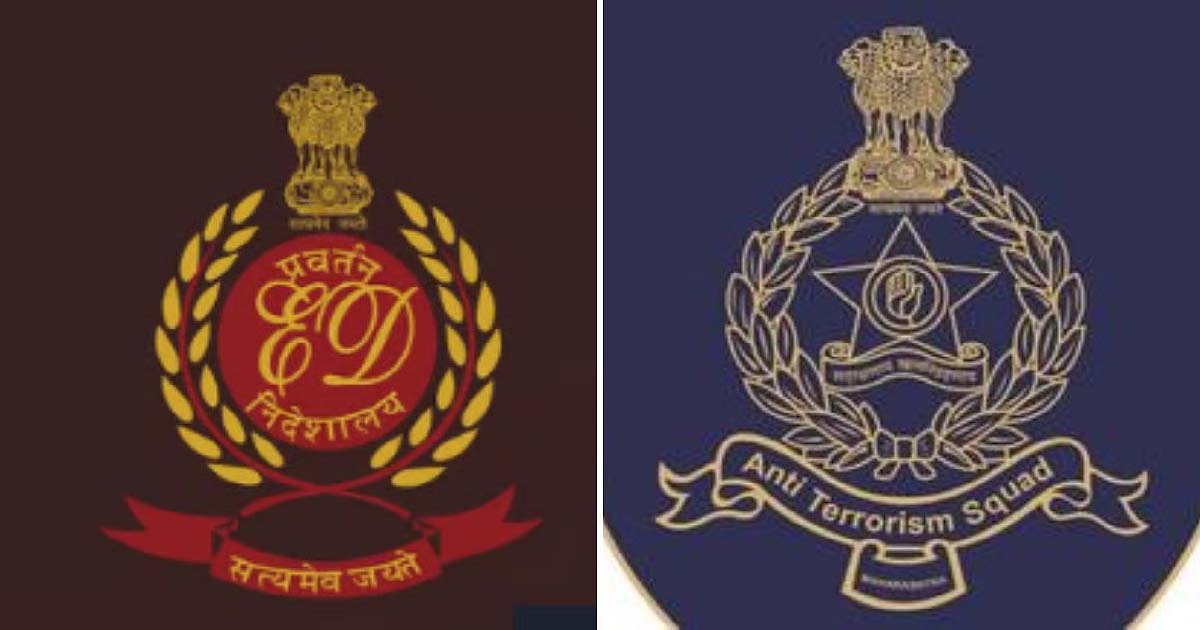
Mumbai: The Enforcement Directorate (ED) on Thursday carried out a coordinated search operation in Borivali village near Padgha in Thane district, with assistance from the Maharashtra Anti-Terrorism Squad (ATS), officials said.
The operation, which began in the early hours of Thursday, extended to multiple residential premises as ED officials probed suspected terror funding and related financial transactions. ATS personnel provided on-ground support to coordinate the ED searches.
According to ED officials, the searches were conducted at nearly 40 locations across Maharashtra including Padgha, Pune, and Malegaon as well as in Delhi. The searches are linked to suspected financial transactions associated with terror-related activities.
The ED had recently registered an ECIR linked to the NIA’s ISIS terror module case involving Saquib Nachan, as well as the Pune ISIS module case. While ATS is simultaneously investigating the same modules, it is assisting the ED by sharing intelligence, leads, and field updates, helping ensure that the ongoing search operations are thorough, coordinated, and synchronised.
Officials said the operation is ongoing, with teams continuing to probe the suspected financial networks connected to the terror modules.
-

 Crime3 years ago
Crime3 years agoClass 10 student jumps to death in Jaipur
-

 Maharashtra1 year ago
Maharashtra1 year agoMumbai Local Train Update: Central Railway’s New Timetable Comes Into Effect; Check Full List Of Revised Timings & Stations
-

 Maharashtra1 year ago
Maharashtra1 year agoMumbai To Go Toll-Free Tonight! Maharashtra Govt Announces Complete Toll Waiver For Light Motor Vehicles At All 5 Entry Points Of City
-

 Maharashtra1 year ago
Maharashtra1 year agoFalse photo of Imtiaz Jaleel’s rally, exposing the fooling conspiracy
-

 National News1 year ago
National News1 year agoMinistry of Railways rolls out Special Drive 4.0 with focus on digitisation, cleanliness, inclusiveness and grievance redressal
-

 Maharashtra1 year ago
Maharashtra1 year agoMaharashtra Elections 2024: Mumbai Metro & BEST Services Extended Till Midnight On Voting Day
-

 National News1 year ago
National News1 year agoJ&K: 4 Jawans Killed, 28 Injured After Bus Carrying BSF Personnel For Poll Duty Falls Into Gorge In Budgam; Terrifying Visuals Surface
-

 Crime1 year ago
Crime1 year agoBaba Siddique Murder: Mumbai Police Unable To Get Lawrence Bishnoi Custody Due To Home Ministry Order, Says Report



